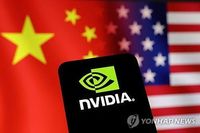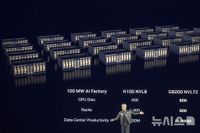As tensions between the United States and China escalate, the semiconductor industry is bracing for significant upheaval. On March 26, 2025, the Financial Times reported that China's National Development and Reform Commission (NDRC) has rolled out new regulations mandating that domestic companies utilize high energy efficiency chips when constructing or expanding artificial intelligence (AI) data centers. This move has far-reaching implications for Nvidia, the leading supplier of AI chips, particularly its H20 model, which does not meet the new standards.
The H20 chip, while not as powerful as Nvidia's latest offerings, was designed to circumvent U.S. export controls on its more advanced H100 chip. However, with the new regulations, its future in China is now uncertain. The H20 has been a popular choice among Chinese tech giants, including Alibaba, ByteDance, and Tencent, contributing to Nvidia's substantial revenue stream from the region. In fact, China represents Nvidia's fourth-largest market, with annual sales projected at approximately $17.1 billion (25 trillion won).
Industry insiders have raised concerns that the enforcement of these regulations could effectively render the H20 unusable in China, compelling companies to pivot towards domestic alternatives, such as those offered by Huawei. An anonymous source disclosed that Chinese regulators have been quietly restricting major tech firms from purchasing H20 chips over the past few months, raising alarms about the chip's viability in the market.
Despite the regulations currently being advisory, there are fears that stricter enforcement could follow. If this happens, Nvidia's Chinese business could face a significant downturn. The company's stock felt the immediate effects of these developments, plummeting by 5.74% on March 27, 2025, closing at $113.76. Other semiconductor stocks, including those of suppliers like SK Hynix, also experienced declines due to the ripple effects of these new rules.
In response to these challenges, Nvidia is reportedly preparing to engage with high-ranking Chinese officials to negotiate a way forward and explore potential adjustments to the H20 chip specifications to meet regulatory demands. However, experts are skeptical about the effectiveness of such modifications. Nvidia's CEO, Jensen Huang, stated during a recent keynote address at the GTC 2025 conference that "our products offer exceptional energy efficiency and value in all markets," emphasizing the company's commitment to maintaining its presence in China.
As the semiconductor landscape shifts, the implications of these regulatory changes extend beyond Nvidia. The new rules are part of a broader strategy by the Chinese government to enhance semiconductor self-sufficiency amid rising tensions with the U.S. An industry insider commented, "The U.S. pressure is pushing China to increase its semiconductor independence. Domestic companies must enhance their responsiveness to potential market turbulence."
Additionally, the NDRC's move comes on the heels of an ongoing investigation into Nvidia for alleged violations of anti-monopoly laws, further complicating the company's standing in China. The investigation, which began in December 2024, highlights the increasing scrutiny faced by foreign firms operating in the Chinese market.
While the new regulations primarily target the construction of new AI data centers, existing data centers may still utilize H20 chips as companies look to circumvent the rules. Reports indicate that major tech firms are already strategizing to replace outdated chips in their current data centers with the H20 to maximize their operations under the current regulatory climate.
As the situation develops, the semiconductor industry will be watching closely. The interplay between U.S. export controls, Chinese regulatory measures, and the competitive landscape of AI technology will undoubtedly shape the future of the market. With domestic alternatives gaining traction, Nvidia's ability to navigate these turbulent waters will be crucial for its continued success in one of its most critical markets.
In conclusion, the introduction of these regulations by the Chinese government marks a pivotal moment for Nvidia and the semiconductor industry at large. As companies adapt to the new landscape, the potential for increased competition from domestic firms looms large, challenging Nvidia's long-held dominance in the Chinese market.





